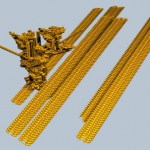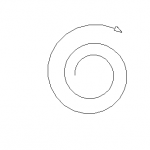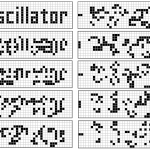Computer Science
The twelfth annual SqUINt conference is being held this week and unfortunately I'm missing my favorite conference (though a gaggle of grad students have been sent Santa Fe bound.) The schedule looks really good this year including a great list of invited speakers (Scott Aaronson (MIT), Rainer Blatt (Innsbruck), Matt Hastings (Station Q), Dieter Meschede (Bonn), Keith Schwab (Caltech), and John Watrous (Waterloo)). Notice the awesome mix of theory and experiment...good stuff. Hope everyone who is attending is having a fantastic time: have some green chiles for me please.
"Ideal conversation must be an exchange of thought, and not, as many of those who worry most about their shortcomings believe, an eloquent exhibition of wit or oratory" - Emily Post(er)
As a literature major physicist, one of the biggest culture shocks I've encountered when attending theory computer science conferences (STOC and FOCS) is the lack of a poster session at these conferences (or at least the ones I attended, which, truth be told, is not many.) Admittedly, I'm a sucker for free wine, beer, and cheese (or at least a cash bar peoples) and some of my warmest thoughts are of the…
QIP 2010 talks and associated papers if I could find them (amazing how almost all papers for this conference are available, for free, online at one location....also interesting how papers seem to cluster in the 10-12 months of the listings :) ) If anyone has corrections please leave a comment.
Monday
Daniel Gottesman and Sandy Irani
The quantum and classical complexity of translationally invariant tiling and Hamiltonian problems
arXiv:0905.2419
Rahul Jain, Iordanis Kerenidis, Greg Kuperberg, Miklos Santha, Or Sattath, and Shengyu Zhang
On the power of a unique quantum witness
arXiv:0906.…
"The miracle of the appropriateness of the language of mathematics for the formulation of the laws of physics is a wonderful gift which we neither understand nor deserve." - E. P. Wigner
Our universe, or at least our understanding of the universe, appears to allow us to see its naked underbelly only through the use of mathematical reasoning. As Wigner says about this state of affairs, we neither understand nor deserve this. On the other hand, I've come to believe, this observation can also be a huge aid in describing the world of theoretical computer science. There is no doubt in most…
I just saw this neat blog post about Conway's Game of Life projected into three dimensions. You can download the script and play around with it yourself!
My first exposure to programming was as a nerdy elementary schooler playing with Logo, a simple computer language written for educational use as a way to teach basic concepts in programming and computer science. The language controls the behavior of the "turtle," a triangular cursor in the middle of the screen that can be programmed to move around and draw lines.
In one of the kid's versions I remember that the cursor even looked like a little turtle on the screen, not just a triangle. As you probably could tell, I'm fascinated by how computer scientists use language from living things and…
What does it mean to create life in a computer? In 1970, John Conway built a simple computer game where a user decides which boxes in a grid are populated and then hits start, letting the computer "evolve" depending on the initial conditions. Each "cell" of the grid can be "alive" or "dead" and has eight neighbors that determine its survival into the next "generation". The rules are pretty simple:
If a live cell has fewer than two (underpopulation) or more than three (overpopulation) live neighbors, it will die
if a dead cell has three live neighbors, it will come to life
and if a live cell…
The latest issue of IT Professional (v11i6) has some interesting articles on strategic planning for IT organizations.
Information Technology Strategic Planning by Hong, Edward K
IT Innovations: Evaluate, Strategize, and Invest by Sahoo, Manas
Professional and Interpersonal Skills for ICT Specialists by Llorens-Garcia, Ariadna; Llinas-Audet, Xavier; Sabate, Ferran
IT and Business Alignment: The Effect on Productivity and Profitability by Nash, Elby M.
Finding Your True IT Transformation by Kraynak, Peter
Copyright Infringement and Protection in the Internet Age by Berti, John
Virtual Teams…
Stuff to read while you wait around for finals and the Christmas holidays:
Via alea one of the odder invocations of NP-completeness: Rowing and the Same-Sum Problem Have Their Moments
An update on the status of US science funding for the next budget year at Computing Research Policy Blog
An interesting paper is out on a href="http://arxiv.org/abs/0911.3635">Quantum Metropolis Sampling. The key insight (slaps head) in getting a Metropolis like algorithm to work is not to make a full energy measurement but to only reveal a small bit of the information relevant for whether to accept or…
Faster computers come out all the time, but it's what we do with a CPU that determines its true usefulness. On Good Math, Bad Math, Mark Chu-Carroll introduces us to Google's new programming language, Go. Noting the minimalist design of the language, Chu-Carroll writes "if you want a C-like language with some basic object-oriented features and garbage collection, Go is about as simple as you could realistically hope to get." On the hardware side of things, Jonah Lehrer reports on The Frontal Cortex that IBM researchers have simulated the synaptic equivalent of a cat's brain, using 147,456…
The September Communications of the ACM has a provocative article by Peter J. Denning and Paul S. Rosenbloom, Computing: the fourth great domain of science (OA version). It's well written and persuasive, certainly worth reading the whole thing.
Science has a long-standing tradition of grouping fields into three categories: the physical, life, and social sciences. The physical sciences focus on physical phenomena, especially materials, energy, electromagnetism, gravity, motion, and quantum effects. The life sciences focus on living things, especially species, metabolism, reproduction, and…
Blackjack, or 21, is a game that many enjoy wasting their money playing at casinos. For those who don't like to waste their money, or at least want to waste it more slowly than others, card counting is a time honored tradition for moving the odds away from the casino and in the players direction (blessed be Ed Thorp.) In other words it makes the game at least slightly enjoyable for those who like to win. But now a graduate of the University of Dundee, Kris Zutis, is going to ruin this small smidgen of fun:
A University of Dundee graduate has created a computer system with the potential to…
The IEEE Computer Society's magazine IT Professional has a special issue on Ontologies, OWL, and the Semantic Web (v11i5). There's lots of very cool-looking stuff, mostly pretty basic.
Guest Editor's Introduction: Ontologies, OWL, and the Semantic Web by Jepsen, Thomas C.
Semantic Web Technologies: Ready for Adoption? by Janev, Valentina; Vranes, Sanja
Equal Format Databases and Semantic-Relational Encoding by Keith, Dean
Just What Is an Ontology, Anyway? by Jepsen, Thomas C.
A couple of other non-semantic web articles that look worth checking out:
Joining the Conversation about IT Ethics…
Two conferences. Renato Renner sends along a note about QIP 2010. The paper submission deadline is one month away:
QIP 2010 will be held in Zurich, Switzerland, January 18-22.
The submission deadline for contributed talks is 22 October 2009.
For more information, please see http://www.qip2010.ethz.ch
We look forward to welcoming you to Zurich,
the organizers
Also a conference on superconducting qubits in San Diego:
Please note our conference coming next spring; Coherence in Superconducting Qubits, to be held April 25-28, 2010, in San Diego, CA.
The agenda and registration are described at…
That's the question asked by Lance Fortnow in a recent Communications of the ACM Viewpoint article (free fulltext).
Fortnow's article continues a discussion about scholarly communication patterns in computer science that's been going on for a while in the "pages" of the CACM. I've blogged about it a couple of times here and here.
Fortnow's main idea is that CS needs to get past the youthful stage of using conferences as the main vehicle for disseminating new ideas and move to a journal-based model, like most of the rest of scientific disciplines. In the end, it's all about peer review:…
The Netflix prize for movie rankings has been awarded with the winner being BellKor's Pragmatic Chaos. This is very cool, but since it's Monday I think we need a good dose of reality. So here is the first comment on the New York Times Bit blog:
This sounds like an interesting project, but they ought to emphasize acquiring more movies for their online streaming than telling people what to watch. - kt
Good work, BellKor's Pragmatic Chaos, but could you work on that tube that delivers my potato chips without me having to get up to go to the kitchen?
I've always thought the born-digital, high-quality review articles (called "lectures") that Morgan & Claypool publish as part of their Synthesis product are one of the best products out there. They really get publishing scholarly and professional materials in the digital age.
One of their most interesting lecture series is the Synthesis Lectures on Engineers, Technology and Society.
Three new lectures in that series look to be perfect texts for a broad range of Engineering & Society-type course. In fact, I think a pretty good course along those lines could use nothing but the…
Just yesterday I posted on preserving the the history of the computing field, musing at the end that digitization projects could save a lot of documents.
Well, what comes along today in the latest What's New @ IEEE for Students is a note about the IEEE-USA History Project:
Digital Archives, Organization's Four Decades of Service Unveiled
IEEE-USA is building a digital archive featuring documents and photos of its 36-year history of promoting the careers and public policy interests of U.S. IEEE members. Part of the IEEE-USA History Project, the archive features:
An overview of the first four…
An interesting article from the most recent IEEE Annals of the History of Computing, Preserving Records of the Past, Today by James W. Cortada. In concerns the difficulty that scholars of the history of computing have in finding primary materials to work with, mostly in the form of documents.
Scholars examining the history of information technology run into many practical, nuts-and-bolts problems more frequently than historians in other fields that
have existed for considerable periods of time, such as diplomatic and political national history. Problems with the history of information…
How do you build a computer out of fire?
(Motivated by the observation that if you take three pieces of string and tie them together at a single point, you can make an OR gate. If we denote the presence of fire on a string as a 1 and the absence of fire as a 0, then this contraption clearly computes the OR function. But OR by itself is not universal.)



